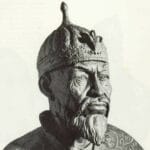Prepare to uncover the mind-boggling truths hidden within the writings of Procopius, a mysterious historian from Byzantine times. Join us on a thrilling journey through history as we explore the incredible insights and jaw-dropping secrets buried within Procopius’s chronicles. Get ready for an unforgettable adventure as we dive deep into the past!
Unbelievable Facts About Procopius
History can sometimes feel a bit…sanitized, right? Like we only get the official, polished version of events? Well, Procopius, a 6th-century Byzantine historian, was like the ultimate behind-the-scenes gossipmonger. He spilled the tea about the Byzantine Empire, and let’s just say some of it is pretty wild.
For starters, this guy wrote a whole book called the “Secret History.” True to its name, it’s like a tell-all about Emperor Justinian and his wife, Empress Theodora. Think your family drama is bad? Procopius paints these two as power-hungry, ruthless, and possibly even involved in some shady stuff, including murder!
Now, historians today still debate how much of Procopius’s account is true. It’s just one perspective, possibly influenced by personal grudges or the desire to entertain. But even if exaggerated, it gives us a glimpse into the whispers and rumors swirling around the Byzantine palace.
And Procopius didn’t hold back when it came to the bubonic plague, either. Having lived through that nightmare, his descriptions of the disease are vivid and terrifying. Imagine a whole society crumbling under the weight of a horrific pandemic – it’s enough to give you chills. He truly captures how devastating it was for the Byzantine world.
But it wasn’t all doom and gloom with Procopius. He also appreciated the grandeur of his time. In his book “The Buildings,” he raves about the architectural marvels that Justinian built, especially the Hagia Sophia. Can you imagine seeing that masterpiece for the first time? Procopius’s writing almost transports you back to that moment, marveling at the sheer scale and beauty of it all.
So, who was Procopius? Was he a bitter ex-official with an ax to grind, or a truth-teller trying to expose corruption? We may never know for sure. But one thing’s certain: his writings provide a fascinating, unfiltered glimpse into a pivotal moment in history. If you’re interested in the Byzantine Empire – the good, the bad, and the downright scandalous – Procopius is your guy. Trust me, he’ll keep you hooked.
What Was Procopius Best Known For?
Procopius of Caesarea wasn’t just some scribe; he was like the ultimate insider during the Byzantine Empire’s heyday. He had a front-row seat to some of the most significant events of that era and a talent for storytelling that has captivated readers for centuries.
1. Spilling the Tea: “The Secret History”
Imagine the juiciest gossip about Emperor Justinian and Empress Theodora. That’s Procopius’s “Secret History.” This tell-all memoir is filled with scandals and intrigue that would make your jaw drop.
Some historians believe Procopius might have had a personal grudge against Justinian and Theodora. This theory suggests that “The Secret History” might be biased, presenting them in a negative light. While we can’t be certain about his motivations, “The Secret History” is undeniably an entertaining read.
2. On the Battlefield: “The Wars”
Procopius also had a head for military history. In “The Wars,” he chronicles the epic battles fought during Justinian’s reign. Imagine reading about the clash of swords and the roar of the crowds as Byzantine armies, led by the brilliant general Belisarius, conquered their enemies.
This book isn’t just a dry recounting of facts and figures; Procopius brings the battlefield to life, offering a glimpse into the strategies and tactics that shaped the Byzantine Empire’s military might.
3. Marveling at Masterpieces: “The Buildings”
Procopius was also a bit of an architecture buff. In “The Buildings,” he takes us on a tour of the architectural wonders built during Justinian’s time, structures like the Hagia Sophia, a testament to the empire’s wealth and artistry.
Reading “The Buildings” is like stepping back in time. Procopius’s detailed descriptions allow us to appreciate the grandeur and ambition of a bygone era.
So, Why Does Procopius Still Matter?
Procopius’s work offers a unique perspective on a pivotal period. Because he witnessed these events firsthand, his writings provide invaluable insights into the political, social, and cultural landscape of the Byzantine Empire. He doesn’t just tell us what happened; he paints a vivid picture, drawing us into his world.
However, every historian has a perspective, a lens through which they view the past. While his works are treasures of historical information, it’s crucial to approach them with a critical eye, considering the possibility of bias and the limitations of his viewpoint.
So, if you’re looking to dive into the world of the Byzantine Empire, Procopius is your guy. Just remember to keep your critical thinking cap on!
Why is Procopius Important to History?
Imagine trying to understand a giant puzzle but missing a bunch of pieces. Procopius is like finding those missing pieces. He gives us this incredibly detailed view of the Byzantine Empire in the 6th century, a time of major change.
His book, “History of the Wars,” puts us right on the front lines of Emperor Justinian I’s military campaigns. We’re talking epic battles, conquests in North Africa and Italy, the whole shebang! Procopius saw much of it firsthand as an advisor to Belisarius, Justinian’s top general. Talk about being in the right place at the right time!
But here’s where it gets juicy. Procopius also wrote a “Secret History,” and believe me, it lives up to its name. Remember that whole “insider” thing? This book is where Procopius spills all the tea: scandals and corruption within Justinian’s court, rumors about the emperor’s paranoia, whispers of Empress Theodora’s shady dealings – it’s like the gossip column of the 6th century, but with much higher stakes!
Now, some historians think Procopius might have exaggerated some things in the “Secret History.” Maybe he had a bone to pick with Justinian and Theodora. But even if he did embellish a bit, his writings give us this incredibly vivid – and let’s be honest, entertaining – look at the Byzantine world.
Procopius is important because he helps us understand not just the big events of the Byzantine Empire, but also the everyday lives and dramas of the people who lived through them. He’s a bridge between the ancient and medieval worlds, and his works continue to fascinate historians and history buffs alike. Who knows, maybe there are still more secrets waiting to be uncovered in his writings!
Was Procopius Reliable?
So, can we trust everything Procopius said? It’s complicated.
When it comes to the big military campaigns and the drama with the Sasanian Empire, Procopius’s stories often match up with other sources. Since he was there in the thick of it, he probably had a pretty good handle on those events.
But Procopius also had a knack for storytelling, and he wasn’t afraid to spice things up. He loved to spill the tea, especially when it came to Justinian and his wife, Theodora. In his “Secret History,” he goes all out, painting them as power-hungry, scandalous figures.
Some historians think he might have been settling scores. Maybe he had a bone to pick with the emperor and empress? It’s also possible he just got carried away with his writing and exaggerated a bit (or a lot).
So, was Procopius a reliable source? It’s not a simple yes or no. He gives us a peek behind the curtain of the Byzantine Empire, but we have to remember that he was looking through his own lens. We can learn a lot from him, but it’s always a good idea to take his stories with a grain of salt and consider other perspectives too.
Here’s a quick rundown:
| Procopius’s Writings | Reliability | What to Keep in Mind |
|---|---|---|
| Military Campaigns | Generally considered trustworthy | He was an eyewitness to many events. |
| Sasanian Affairs | Often aligns with other sources | He likely had access to reliable information. |
| “Secret History” | Highly subjective and potentially biased | His motivations for writing it are debated. |
| Character Sketches | Often exaggerated or one-sided | He had personal opinions and potential grudges. |
The Bottom Line:
Procopius is a fascinating but complex figure. While his biases and love for juicy gossip are clear, his writings still offer valuable insights into the Byzantine world. It’s up to us to read between the lines, weigh the evidence, and come to our own conclusions. And hey, that’s what makes studying history so interesting – there’s always more to uncover and debate!
Who Did Procopius Write the Plague For?
Let’s dig a little deeper into why Procopius felt the need to write during the plague, a time of such chaos.
Procopius wasn’t just writing for the sake of it. It’s likely he felt a sense of duty to chronicle these events as they unfolded. Imagine living through a pandemic that’s reshaping the world – you’d probably want to document it too!
Now, Procopius wasn’t exactly a fan of Emperor Justinian. He saw the plague as a divine message, a consequence of the emperor’s choices. Imagine thinking a pandemic was a direct result of a leader’s actions! That’s some serious shade Procopius was throwing. He basically accused Justinian of focusing more on taxes and fancy buildings than on the well-being of his people. Talk about bad PR!
But we’re talking about a time when beliefs and understandings of the world were very different from our own. The idea of a plague being a punishment from a higher power wasn’t all that unusual back then.
What’s important is that Procopius, through his writing, gives us a window into the past. He shows us how people interpreted these events and how leadership, even in ancient times, played a crucial role in shaping people’s lives, especially during times of crisis. It makes you think, doesn’t it?
Some scholars suggest that Procopius might have had other motivations too. Was he trying to warn future generations? Was he using the plague as a metaphor for something else entirely? These are questions that continue to fascinate historians today.
The truth is, we may never know for sure who Procopius was truly writing for. But one thing’s for certain: his account of the plague remains a valuable historical document that offers insights into a time of great upheaval and change.
What is the Secret History of Procopius About?
We’ve talked about Procopius’s official histories, but then there’s this other book, the Secret History. Think of it like the juicy gossip magazine of the 6th century.
Imagine writing a whole book praising your emperor, making him sound like the best thing since sliced bread. That’s what Procopius did in his official history of Justinian’s rule. But behind the scenes, he was secretly penning the Secret History – and trust me, it was piping hot.
This book is basically Procopius’s unfiltered tell-all, filled with shocking stories and rumors about Emperor Justinian, Empress Theodora, and pretty much everyone important in the Byzantine Empire. He paints Justinian as a power-hungry, possibly even cruel, ruler – a far cry from the glorious leader he portrayed in his public writings.
Why the difference? Some historians suggest that Procopius might have had a personal grudge against Justinian, perhaps feeling slighted or betrayed.
Think of it like reading a tell-all about celebrities today. You’d take it with a grain of salt, right? The same goes for the Secret History. While it offers an intriguing peek behind the curtain of power, we can’t be sure how much is true and how much is embellished or even fabricated.
Imagine someone writing a tell-all about a current political leader, revealing all their supposed secrets and scandals. Would you believe everything? Probably not. You’d likely consider the author’s biases and motivations.
Despite this, the Secret History remains a captivating read. It’s like listening in on whispered rumors about the rich and famous. It reminds us that history is often written by the victors and that there are always multiple sides to every story.
While we might never know the complete truth about Justinian and his court, the Secret History offers a tantalizing glimpse into a world of power, ambition, and secrets.
What Language Did Procopius Speak?
Procopius was born in Caesarea, Palestine, and his native tongue was Greek. He was deeply familiar with classical forms of the language, a fact that shines through in his writing. His command of Greek helped him paint vivid pictures of Emperor Justinian I’s reign and the major happenings of his time.
While Greek was Procopius’s main language, things get a bit more complex when we consider the linguistic landscape of the Byzantine Empire, a melting pot of cultures and languages.
It’s very likely he encountered Latin, the administrative language of the empire, especially during his time in Constantinople. Did he speak it fluently? It’s hard to say for sure based on the available information.
Some scholars suggest that he might have understood and perhaps even spoken Latin to a certain degree, given his position in the imperial court and his interactions with officials who used Latin. However, there’s no direct evidence of Procopius writing in Latin or mentioning his proficiency in the language. This is a great example of how history still holds mysteries! Even with figures as seemingly well-documented as Procopius, there’s always more to learn and uncover.
Who Was Justinian and What Is He Remembered For?
Justinian I ruled the Byzantine Empire from 527 to 565 AD, and he wasn’t just sitting around. This guy left a serious mark! He was a bit of a control freak in a good way, totally revamping how the empire was run, making things more efficient and centralized. Think of it like streamlining a company for maximum productivity – that was Justinian’s jam!
But there’s more! Remember how messy Roman law was getting? Justinian decided to tackle that beast head-on. He gathered up all those legal scrolls and had his team compile them into a neat package we now call the “Codex Justinianus.” This thing was huge! It became the cornerstone of law for Byzantium and even influenced legal systems in Europe for centuries to come.
Now, Justinian wasn’t just a bookworm emperor. He also loved military campaigns, longing to restore the Roman Empire to its former glory. With talented generals like Belisarius by his side, the Byzantine army managed to snatch North Africa back from the Vandals and Italy from the Ostrogoths. These victories significantly expanded the Byzantine Empire, bringing it closer to its old Roman borders.
And one more thing! Justinian had great taste in art and architecture. Under his rule, some of the most stunning examples of Byzantine architecture were born. Ever heard of the Hagia Sophia, that architectural marvel in Constantinople, considered one of the most beautiful buildings in the world? It was built under Justinian’s watch. And it wasn’t just the Hagia Sophia — churches, monasteries, and other public buildings sprung up all over, showcasing the unique beauty of Byzantine art and architecture.
Justinian’s reign wasn’t always smooth sailing. There were revolts, plagues, and all sorts of challenges. But through it all, he left a powerful legacy. He strengthened the Byzantine Empire, preserved Roman law (thank you, Codex!), and fostered a golden age of art and architecture.
Even today, historians and scholars are digging deeper into Justinian’s life and reign. There’s still debate about some of his policies and their long-term effects. But one thing’s for sure: Justinian was a pivotal figure in Byzantine history, and his influence is still felt centuries later.
When Did Procopius Write History of Wars?
Procopius was living and working in the 6th century AD for the Byzantine Emperor Justinian I. This Justinian guy was really big on expanding his empire, and Procopius, being a sharp cookie, decided to jot down all the action in “History of the Wars.”
This wasn’t just some quick diary entry; we’re talking eight whole books detailing Justinian’s military campaigns. Procopius covered everything from Justinian taking the throne in 527 AD right up to 553 AD. He had a front-row seat to the Vandalic War in North Africa and the Ostrogothic War in Italy, witnessing those battles, the strategies, the victories, and maybe even the snacks they had back then (okay, maybe not the snacks).
What makes Procopius’s work so special is that he was there. He saw things firsthand. Researchers today still rely on Procopius to understand this complex period. His attention to detail and his unique position as an eyewitness make his writing a goldmine for anyone wanting to know what really went down during Justinian’s reign.
But here’s the thing about history: it’s not always a done deal. New discoveries are always popping up, and sometimes they make us rethink what we thought we knew. While Procopius’s work is considered a cornerstone of Byzantine history, experts are always digging deeper, comparing sources, and piecing together the puzzle of the past. So, while we have a pretty good idea of when and where Procopius wrote his masterpiece, the exploration and debate about the finer details of his life and work continue to fascinate historians today.
What Characteristic Does Procopius Stress in the Secret History?
Procopius doesn’t hold back in his “Secret History.” He really hones in on the power and influence wielded during Justinian’s reign, but not always in a good way. He practically accuses Justinian and his top general, Belisarius, of being totally whipped – and not by the thrill of battle but by their own wives! Procopius seems to see this as a real upset to how things should be, and it clearly gets under his skin.
And those reforms that Justinian was so proud of? Procopius wasn’t impressed. If anything, he seems to think Justinian was resistant to real change. He suggests that by trying to shake things up, Justinian actually made things worse, chipping away at the values that held society together. Talk about unintended consequences!
Procopius saves his most scathing critiques for Justinian’s court. He paints a picture of corruption and immorality that would make your hair curl. You can practically feel the disgust dripping from his words as he describes the behavior of the emperor and his buddies. It’s clear he thinks they’ve all gone completely off the rails, morally speaking.
Key Takeaways:
- Procopius emphasizes just how much power and influence, often negative, shaped life in the Byzantine court.
- He criticizes Justinian’s inflexibility and resistance to change, arguing that it undermined the principles he was trying to uphold.
- The “Secret History” reads like a tell-all exposé, overflowing with Procopius’ disgust at the corruption and immorality within Justinian’s inner circle.
What Did Procopius Say About Hagia Sophia?
Hagia Sophia was the architectural wonder of its time, and luckily, we have Procopius’s firsthand account to tell us all about it. This Byzantine historian saw it all, and boy, did he have things to say!
He was totally blown away by how stunning and well-balanced Hagia Sophia was. Every part of the building seemed to fit perfectly together, nothing out of place, creating incredible beauty and harmony.
And then there was the light! Procopius was convinced that the way Hagia Sophia was lit wasn’t just clever architecture – he thought it was divine intervention. It was like God himself was shining a light down on the building, making it feel totally otherworldly.
The dome completely floored him. It was massive, but Procopius said it looked so light and airy that it felt like it was almost floating, held up by delicate arches. It was an architectural marvel that would make anyone question how it was even possible!
Oh, and the bling! Procopius was obsessed with how lavishly decorated Hagia Sophia was, especially the sanctuary. He mentioned that they used a crazy amount of silver – like, 40,000 pounds of it! Talk about showing off the Byzantine Empire’s wealth and power!
To sum it all up, here’s what Procopius thought of Hagia Sophia:
- It was the most beautiful and impressive building he had ever seen.
- The lighting was so incredible he believed it was a sign from God.
- The dome seemed to defy gravity, appearing to float effortlessly above the building.
- The amount of silver used in the decoration was a testament to the Byzantine Empire’s wealth and influence.
It’s fascinating to read Procopius’s account of Hagia Sophia because it gives us a glimpse into how people back then experienced this architectural masterpiece. He wasn’t just describing the physical building; he was capturing the awe and wonder it inspired. Reading his words, it’s hard not to feel a little bit of that awe ourselves, even all these centuries later.
You will be amazed to know all these extraordinary facts about Ariane de Rothschild. To know more about her, a must-read for every fan. If you are not aware of facts about Amanda Nunes, check it out now, and also don’t miss all the latest facts about Johnny Gargano, which are a must-read for his fans.
- Unveiling the Enigma: Mansoureh Khojasteh Bagherzadeh’s Public Appearances & Private Life in Iran - July 18, 2025
- Unveiling the Mystery: Mansoureh Khojasteh Bagherzadeh’s Husband: A Rare Glimpse into a Private Life - July 18, 2025
- Unveiling Masoud Khamenei’s Mother: Power, Influence, and Iran’s Future - July 18, 2025
















